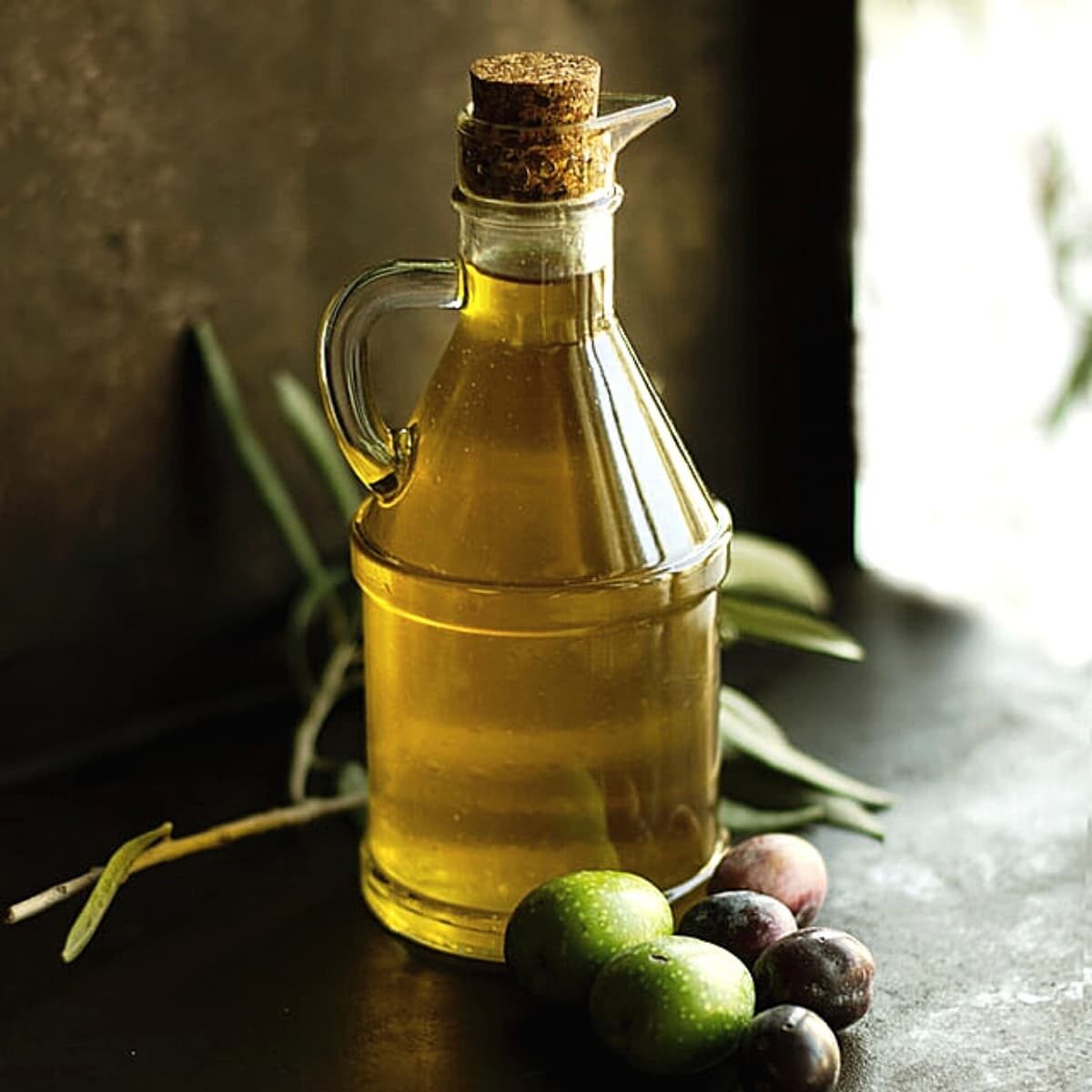This post may contain affiliate links. This means I may make a small commission at no additional cost to you when you make a purchase. Find out more in the Disclosure Policy
What are the differences between olive oils? Pure olive oil vs extra virgin olive oil? Read on to learn the different grades of olive oils and tips to get the most benefit from this healthy monounsaturated fat.

Choose the Best Extra Virgin Olive Oil
Extra Virgin Olive Oil or EVOO
When shopping for Extra Virgin Olive Oil #ad it is important to look for cold-pressed, and non-refined olive oils.
When olive oils have this designation, you know that you will get the most benefit from the oil.
Extra-virgin refers to the first extraction of the olive. Other grades of olive oil are made by subsequent chemical or heat extraction of the olive.
It also designates olive oils with the least amount of oleic acid. This is where you get the most flavorful oil as well as the most healthful benefit.
In addition, extra virgin olive oils contain no more than 0.8% acidity based on a measure of free oleic acid fatty acids in the oil. Higher levels of oleic acid signal a lower quality olive oil.
Extra-virgin Olive Oils are best for salads and raw vegetables.
Virgin Olive Oil
When you see Virgin Olive Oil, it means that the oil was extracted naturally but has up to 2% oleic acid.
Typically, these olive oils are lower quality, won’t have as much flavor as extra-virgin olive oil, but maybe are more moderately priced. This makes Virgin Olive Oil a good choice for cooking.
Pure Olive Oil
Olive oils that aren’t labeled extra virgin or virgin may be labeled as Pure Olive Oils. These oils are refined or chemically extracted olive oils.
The processing of these oils makes them of lesser quality. They are much less flavorful and are often a mixture of refined olive oil with extra virgin olive oil for flavor.
Olive oils keep for approximately 6 months so consider how quickly you will use the oil when you are purchasing. Extra virgin olive oil is pricey so only buy as much as you will use or it may go bad.
Key Differences Between Olive Oils

Extra Virgin
- Made from first oil extraction from olives
- Cold-pressed
- Contains no more than 0.8% acidity
- Very flavorful
- Excellent for salads and drizzling on vegetables
- Considered to have the most health benefits
- Most expensive
Virgin
- Cold-pressed
- Contains higher amounts of acidity, up to 2%
- Still maintains a good flavor
- Good for cooking
- Less expensive
Pure or Olive Oil
- Made by extraction of oil by chemical or heat processes
- Less flavorful
- Usually, a combination of refined olive oil with EVOO mixed in for flavor
- Good for cooking
- Least expensive
Frequently Asked Questions
Olive trees are grown and olive oil is produced in many countries around the world. Spain is one of the key producers of olive oil along with Italy, Greece, and even the United States.
The flavor of olive oil is influenced by:
1. climate,
2. the area where the olive tree is grown, and
3. when the olives are harvested.
An early harvest of green olives produces stronger flavored olive oil.
How olive oil is produced is also important. Cold-pressed Extra-Virgin Olive Oil often has a stronger flavor.
For less flavorful olive oils consider adding spices, lemons, or peppers to the oils to add more flavor. Simply add your flavoring agents to an olive oil bottle or container and top off with olive oil. Store in the refrigerator for a week to allow time for the flavor to infuse into the olive oil.
Generally, extra virgin olive oils will be darker in color, but color can vary between brands of olive oils.
Refined olive oils may be lighter and will be much less flavorful than extra virgin olive oils.
Yes, a recent study compared frying vegetables versus sauteing them or boiling them in water and found that antioxidants and phenols actually increased with frying in olive oil. 4
Bonappetit.com agrees and would use olive oil for pan-frying and sauteing. Deep frying is one hesitation due to olive oil cost.
To preserve polyphenol content, olive oil should be stored in dark glass bottles or in stainless steel containers in cool conditions.
For more information on Olive Oil, check out theoliveoilsource.com.
Olive Oil and the Mediterranean Diet
The Mediterranean Diet is a heart-healthy diet. When you follow it consistently, the Mediterranean Diet will help reduce your risk of heart disease.
In addition, the diet has been extensively studied and found to reduce the risk of diabetes, mood changes, such as depression, and inflammatory conditions such as asthma and arthritis.
But, many people who start the Mediterranean Diet are looking to lose weight. Either because they have put on a few pounds, or because their physician is encouraging them to change their diet.
So what is it about the Mediterranean Diet that makes it so special? The research suggests that a primary factor is the foods, including the type of olive oil that is eaten on the Mediterranean Diet.
For a Mediterranean Food List, check out my post, Mediterranean Diet Basics for the Beginner.
Yes, the Mediterranean Diet is a moderate-fat diet. You may be thinking that it doesn’t seem like a diet for heart health, but it turns out it is.
Monounsaturated Fats
One of the key reasons the Mediterranean Diet is heart-healthy is because the primary at is olive oil. Olive oil contains large amounts of monounsaturated fats as well as other fats. It also includes natural polyphenols or antioxidants that contribute to its taste and other characteristics.
Polyphenols are thought to be instrumental in many olive oil benefits, such as lowering cholesterol.
As its name suggests, olive oil is liquid at room temperature. Similar to other fats, olive oil contains 9 calories per gram.
So to put that in perspective, one teaspoonful of olive oil contains about 4.5 grams or about 40 calories.
Health Benefits of Olive Oil
- Studies show that replacing foods containing saturated fats with foods containing monounsaturated fats, such as extra virgin olive oil helps reduce your risk of heart disease. This happens by lowering unhealthy LDL cholesterol and increasing healthy HDL cholesterol.
2. Foods with monounsaturated fats may help improve glycemic control and how your body processes fat.1, 2
3. Monounsaturated fats, in combination with other fats, are known to help with weight loss. 3
4. Fats are also important in the absorption of vitamins A, D, E, and K.
5. Olive oil also helps boost the flavor of salads and other cooked foods. This along with other fats help you stay satisfied after meals and contributes to weight loss.
6. Lastly, monounsaturated fats are thought to help with mood. 4
Your mood is an important component of any weight loss program. An elevation of mood can often help move the focus of weight loss from the number on the scale to becoming more healthy.

Simple Mediterranean Olive Oil Salad Dressing
While many extra virgin olive oils may be flavorful enough to drizzle on a salad or marinate vegetables, not all regular olive oils will withstand stronger food flavors.
Making an olive oil salad dressing is a great way to add an extra kick to your salads. You can vary the flavor with spices and the type of vinegar you use to form the dressing.
For more on spices, check out my post, Mediterranean Spices - Make Your Taste Buds Sing.
For a simple olive oil salad dressing, you might start with my recipe for Mediterranean Olive Oil Salad Dressing.
This recipe also works great as a marinade for grilling. Whip this up anytime with staple ingredients from your pantry and fridge.
There are a lot of factors to consider when searching for the best olive oil. Choose the best olive oil for your needs by understanding key differences in production, flavor, cost, and health benefits.
September 2021 Update: Images and post updated.



Leave a Reply